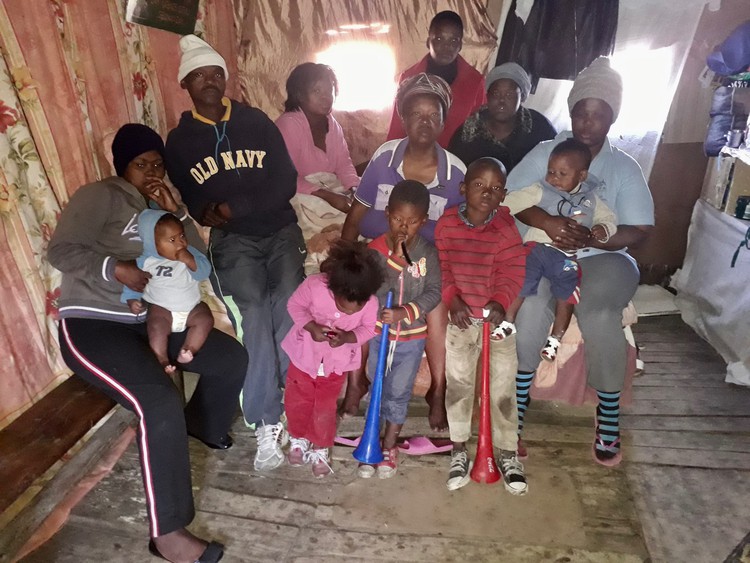14 people live in a one-room shack
Mdantsane woman is trapped by debt
Nomthandazo Mandoyi shares her one-roomed shack with 13 other family members in eMaxelegwini Informal Settlement, Mdantsane NU1. None of them have paid work.
Mandoyi is 51 and she has a number of serious medical conditions. Since 1999, she has been in and out of hospital. She receives a R1,600 monthly disability grant. This and the child support grants for her grandchildren are the only income for the household.
Her leaking, one-room shack is built on a wetland next to a dump site where residents empty buckets of dirty water and also toilet water. Alongside her shack is a pit toilet built by her neighbour. There are also two shebeens next to her.
Inside the shack, there are only two beds. Mandoyi’s bed is an old mattress standing on bricks. She found it at the dumpsite in NU17. It is stuffed with old clothes between the wire springs. People gave them blankets. They do not have electricity, but warm themselves at a fire they make outside.
Mandoyi’s eldest son, Iben, is 37. He has TB. The eldest daughter, Thabisa, is 35 and has never had a job. The third child, Chreana, used to work as a cashier in East London. She now volunteers at a local clinic. She has three children. Merry is 26 and she has three children. Eudicia is 23 and has one child. She also volunteers at a clinic. Mandoyi’s niece, Hezel Dyatjies, also lives with the family. She is still at school.
For the past two years, Mandoyi says she only survives by borrowing from a moneylending closed corporation – SA Debt Administrators – based in East London. Despite what the company name suggests, it is not registered with the National Credit Regulator as a debt counsellor, but it is registered as a credit provider and it trades under the name of S.A.D.A. Cash Loans.
She borrowed R1,800 in May and has to repay R2,804.78 at R934.93 per month for three months, deducted from her Grindrod bank account into which her social grant is paid.
After the second instalment, she is allowed to borrow again. After paying SA Debt Administrators she has less than R700 to buy food and she also has to pay for such things as transport to the hospital for her checkups. A trip costs her R300 for car hire.
“I end up borrowing more money from the loan sharks in my area [at very high interest rates],” she says. These debts are sometimes repaid with the child grant money.
Mandoyi arrived in NU1 in 2014. “I was married, but got divorced. I then moved back to a family house, but my younger sister kicked me out with my children,” she says. “I lost all my furniture and clothes. We were only left with what we were wearing.”
Before eMaxelegwini, the family rented a shack at Velwano informal settlement, a few kilometres away. Chreana was working then and could cover the R250 monthly rental.
When the municipality cleared the informal settlement to make way for RDP houses, Mandoyi was not on the beneficiary list.
“I had to find a place for my family,” she says. A friend found her the space for the shack where she now lives.
Ward 12 councillor Lennox Gosani made the following promise to GroundUp: “I will visit this family myself and I will make sure a temporary shelter is arranged for this family.”
He said he’d register her on a housing database and escalate her situation with social workers.
Support independent journalism
Donate using Payfast

Don't miss out on the latest news
We respect your privacy, and promise we won't spam you.
Next: Khayelitsha land occupiers granted bail
Previous: Youth commemorate sacrifices of the past and protest about the present
© 2017 GroundUp. 
This article is licensed under a Creative Commons Attribution-NoDerivatives 4.0 International License.
You may republish this article, so long as you credit the authors and GroundUp, and do not change the text. Please include a link back to the original article.

